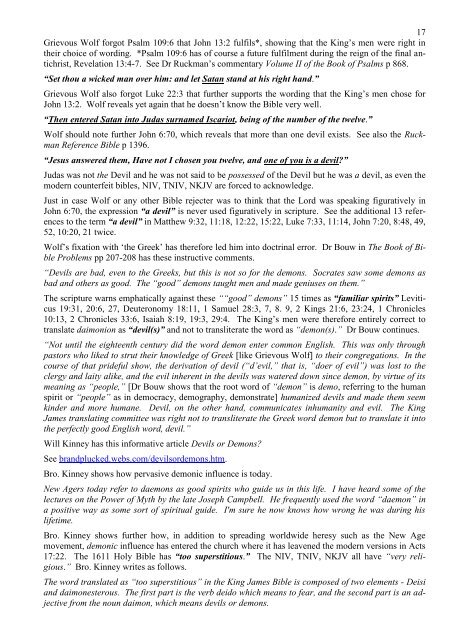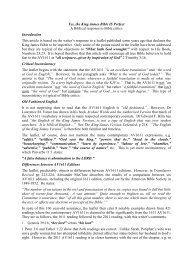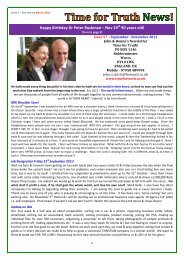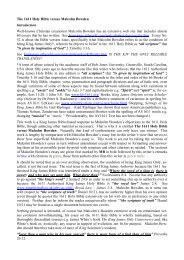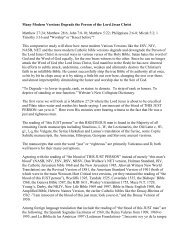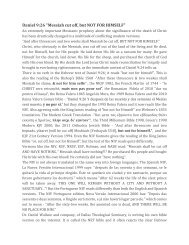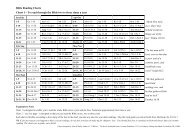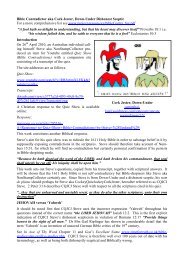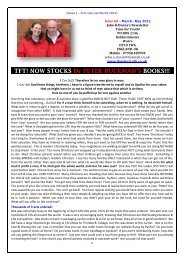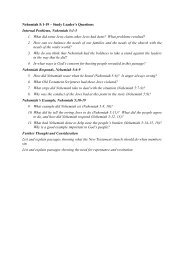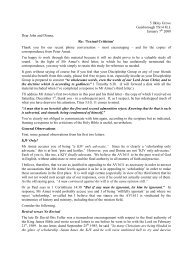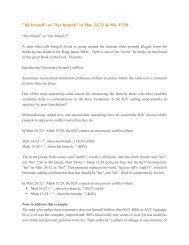A Grievous Wolf - Time for Truth
A Grievous Wolf - Time for Truth
A Grievous Wolf - Time for Truth
You also want an ePaper? Increase the reach of your titles
YUMPU automatically turns print PDFs into web optimized ePapers that Google loves.
17<br />
<strong>Grievous</strong> <strong>Wolf</strong> <strong>for</strong>got Psalm 109:6 that John 13:2 fulfils*, showing that the King’s men were right in<br />
their choice of wording. *Psalm 109:6 has of course a future fulfilment during the reign of the final antichrist,<br />
Revelation 13:4-7. See Dr Ruckman’s commentary Volume II of the Book of Psalms p 868.<br />
“Set thou a wicked man over him: and let Satan stand at his right hand.”<br />
<strong>Grievous</strong> <strong>Wolf</strong> also <strong>for</strong>got Luke 22:3 that further supports the wording that the King’s men chose <strong>for</strong><br />
John 13:2. <strong>Wolf</strong> reveals yet again that he doesn’t know the Bible very well.<br />
“Then entered Satan into Judas surnamed Iscariot, being of the number of the twelve.”<br />
<strong>Wolf</strong> should note further John 6:70, which reveals that more than one devil exists. See also the Ruckman<br />
Reference Bible p 1396.<br />
“Jesus answered them, Have not I chosen you twelve, and one of you is a devil?”<br />
Judas was not the Devil and he was not said to be possessed of the Devil but he was a devil, as even the<br />
modern counterfeit bibles, NIV, TNIV, NKJV are <strong>for</strong>ced to acknowledge.<br />
Just in case <strong>Wolf</strong> or any other Bible rejecter was to think that the Lord was speaking figuratively in<br />
John 6:70, the expression “a devil” is never used figuratively in scripture. See the additional 13 references<br />
to the term “a devil” in Matthew 9:32, 11:18, 12:22, 15:22, Luke 7:33, 11:14, John 7:20, 8:48, 49,<br />
52, 10:20, 21 twice.<br />
<strong>Wolf</strong>’s fixation with ‘the Greek’ has there<strong>for</strong>e led him into doctrinal error. Dr Bouw in The Book of Bible<br />
Problems pp 207-208 has these instructive comments.<br />
“Devils are bad, even to the Greeks, but this is not so <strong>for</strong> the demons. Socrates saw some demons as<br />
bad and others as good. The “good” demons taught men and made geniuses on them.”<br />
The scripture warns emphatically against these ““good” demons” 15 times as “familiar spirits” Leviticus<br />
19:31, 20:6, 27, Deuteronomy 18:11, 1 Samuel 28:3, 7, 8. 9, 2 Kings 21:6, 23:24, 1 Chronicles<br />
10:13, 2 Chronicles 33:6, Isaiah 8:19, 19:3, 29:4. The King’s men were there<strong>for</strong>e entirely correct to<br />
translate daimonion as “devil(s)” and not to transliterate the word as “demon(s).” Dr Bouw continues.<br />
“Not until the eighteenth century did the word demon enter common English. This was only through<br />
pastors who liked to strut their knowledge of Greek [like <strong>Grievous</strong> <strong>Wolf</strong>] to their congregations. In the<br />
course of that prideful show, the derivation of devil (“d’evil,” that is, “doer of evil”) was lost to the<br />
clergy and laity alike, and the evil inherent in the devils was watered down since demon, by virtue of its<br />
meaning as “people,” [Dr Bouw shows that the root word of “demon” is demo, referring to the human<br />
spirit or “people” as in democracy, demography, demonstrate] humanized devils and made them seem<br />
kinder and more humane. Devil, on the other hand, communicates inhumanity and evil. The King<br />
James translating committee was right not to transliterate the Greek word demon but to translate it into<br />
the perfectly good English word, devil.”<br />
Will Kinney has this in<strong>for</strong>mative article Devils or Demons?<br />
See brandplucked.webs.com/devilsordemons.htm.<br />
Bro. Kinney shows how pervasive demonic influence is today.<br />
New Agers today refer to daemons as good spirits who guide us in this life. I have heard some of the<br />
lectures on the Power of Myth by the late Joseph Campbell. He frequently used the word “daemon” in<br />
a positive way as some sort of spiritual guide. I'm sure he now knows how wrong he was during his<br />
lifetime.<br />
Bro. Kinney shows further how, in addition to spreading worldwide heresy such as the New Age<br />
movement, demonic influence has entered the church where it has leavened the modern versions in Acts<br />
17:22. The 1611 Holy Bible has “too superstitious.” The NIV, TNIV, NKJV all have “very religious.”<br />
Bro. Kinney writes as follows.<br />
The word translated as “too superstitious” in the King James Bible is composed of two elements - Deisi<br />
and daimonesterous. The first part is the verb deido which means to fear, and the second part is an adjective<br />
from the noun daimon, which means devils or demons.


